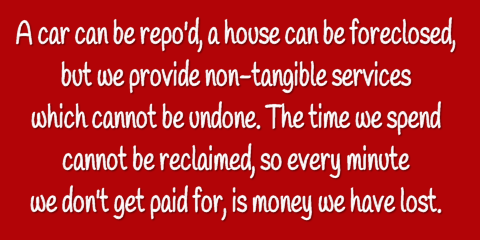We hear about scams and frauds every day in the news. An elderly person is convinced to donate money to a scam charity, or doctors defraud Medicare, or someone’s identity is stolen, or the IRS’s website is hacked….
Thing is – like car accidents – we never think a scam can happen to us. So we simply, and naively, go about our days and our business thinking we are somehow immune. We are such nice people, so very giving, and can’t imagine anyone would ever try to take advantage of us…Right?
No. Wrong. Wrong, and expensive.
One of our APHA members confessed to me last week that she had completed almost $6000 worth of work for a woman in another state who needed help with a social security disability filing. She began the relationship well and correctly, sending a contract for signature, and insisting on partial payment up front. But the woman was so very desperate, pleading… deadlines came up swiftly and needed to be met…… the advocate felt trapped by the desperation and deadlines, jumped right into the work and got it done. The client collected $21,000 in disability payments! Great job, right?
But the uncrossed T’s and the undotted I’s are now coming back to bite the advocate in the backside… because the client never did return the contract with her signature, paid only $500 to get started … and now refuses both her signature and payment for the remaining balance. Not only does she refuse to sign, or pay, but she is now disputing whether the advocate really did any of the work, claiming she did most of it herself.
Say what?
That’s when the advocate contacted me, wanting to know what recourse she might have to collect. In her email to me she made a statement that provided me with one of those lightbulb moments – OMG – this signals the need for a whole new step in an advocate’s prep for working with a new client.
Step: Check out the background of a potential client to see if he or she has a problematic track record, then use that information to determine the timing of being paid.
The statement in the advocate’s email that triggered my realization of the need for this new step was that the advocate, after having her invoice refused in the most vehement of exchanges, eventually googled the client’s name… It took her only a few minutes to learn that not only did the client file bankruptcy a few years ago, but she may have scammed others, too. The client shows up with a couple of different spellings of her name, in a few different states… the advocate is now convinced that the woman never did intend to pay for the work. Her intent all along may well have been to scam the advocate.
Maybe that’s true. Maybe it isn’t. We will probably never know.
But if you are considering working with a client, and the work will involve a lot of your time, and will be billed an amount over some threshold – don’t you think it’s worth spending a few minutes to search out the background of that client?
The minute you do any unpaid work for someone, even if they have signed a contract, even if they have partially paid up front, you become a creditor.
How many businesses do you know of that extend credit without checking out ability and inclination to pay> Not even utility or phone companies do that anymore. They all check credit! Even your co-pays at the doctor’s office are expected to be paid up front.
As a business person and creditor, you need to do the same sort of due diligence, to assure yourself that they will pay you for your work.
So – you have three choices:
- Collect all your money up front
- Run a credit/general background check and if they pass (no bankruptcy, no judgments, no negative financial background), then extend them terms (example: one half to start, then the second half before you do the second half of the work)
- Don’t expect to be paid at all, then be pleasantly surprised if they do.
To be clear – I am not suggesting you turn away anyone who has had credit problems. I AM suggesting you don’t work for them until after they have paid you in full.
Not long ago, Jean Mignolet, a private investigator, was our Guest Expert during one of our APHA Call-ins on just this topic – uncovering the information you need to protect your client and yourself. While most of that conversation was focused on uncovering malpractice and fraud on the part of providers, it is just as appropriate to do so for potential clients and their ability to pay us, too. You can also find advice for how and when to collect your fees in The Health Advocate’s Start and Grow Your Own Practice Handbook.
 As advocates we are service providers, and the only thing we have to “sell” (earn money from) is our time. A car can be repo’d, a house can be foreclosed, but we provide non-tangible services which cannot be undone. The time we spend cannot be reclaimed, so every minute we work and don’t get paid for, is money we have lost.
As advocates we are service providers, and the only thing we have to “sell” (earn money from) is our time. A car can be repo’d, a house can be foreclosed, but we provide non-tangible services which cannot be undone. The time we spend cannot be reclaimed, so every minute we work and don’t get paid for, is money we have lost.
Collecting up front is the way of business for other professions – attorneys, accountants and others. It needs to be our way of business, too. And, in fact, I believe it is far LESS professional to NOT collect up front; far more professional to do so.
The advocate in the story above has now learned an expensive lesson, unfortunately, the hard way. Please don’t let that lesson become so expensive for you. Conduct your business as any profession does, by conducting your due diligence, then collecting your compensation with the appropriate timing for you and your clients.
LEARN ABOUT APHA MEMBERSHIP | MASTER LIST OF PRACTICE RESOURCES | ONLINE COURSES TO LEARN ADVOCACY




